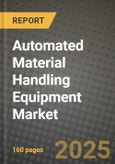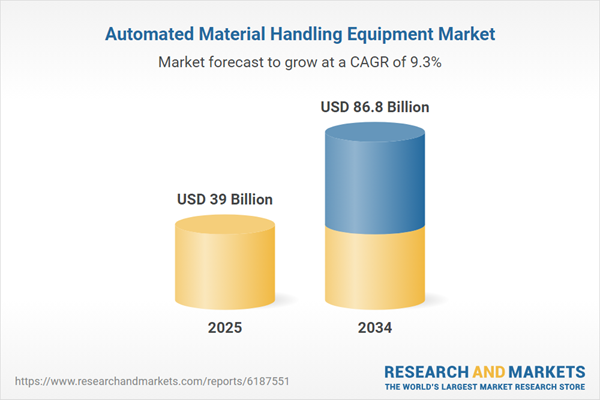The automated material handling equipment market is expanding due to the increasing demand for efficient and safe material handling in various industries. These systems automate the process of moving and storing materials, improving productivity and reducing labor costs. The market encompasses a range of equipment, including automated guided vehicles (AGVs), automated storage and retrieval systems (AS/RS), and conveyors.
Technological advancements in robotics, sensor technology, and software are enhancing the flexibility and efficiency of material handling equipment. The integration of AI and machine learning is improving system optimization and decision-making. The market is witnessing increased demand for flexible and scalable automation solutions.
The competitive landscape is characterized by a mix of robotics companies, material handling equipment manufacturers, and specialized automation providers. Strategic partnerships and collaborations are crucial for developing integrated material handling solutions. The growing focus on Industry 4.0 and the increasing demand for efficient logistics are driving market expansion.
Key Insights: Automated Material Handling Equipment Market
Robotics and Automation: Increasing use of robotic systems for material handling.AI and Machine Learning: Optimizing material flow and decision-making.
Flexible and Scalable Solutions: Adapting equipment to various applications and facility layouts.
IoT and Cloud Connectivity: Improving remote monitoring and management.
Collaborative Robots (Cobots): Increasing adoption of robots that can work alongside humans.
Increased Automation in Logistics and Manufacturing: Growing demand for automation to improve efficiency.
Labor Shortages and Cost Reduction: Automating material handling to address labor shortages and reduce costs.
Improved Safety and Efficiency: Reducing workplace accidents and improving material flow.
Growing E-commerce and Logistics Sector: Increased demand for efficient logistics solutions.
Technological Advancements: Innovations in robotics and sensor technology.
High Implementation Costs: Significant upfront investments in automated material handling equipment.
Integration with Existing Infrastructure: Seamlessly integrating new equipment with existing facility layouts.
System Reliability and Maintenance: Ensuring the reliability and maintenance of automated systems.
Navigation in Dynamic Environments: Navigating complex and dynamic environments.
Cybersecurity Risks: Protecting automated systems from cyber threats.
Automated Material Handling Equipment Market Segmentation
By Product
- Robot
- ASRS
- Conveyors and Sortation Systems
- Cranes
- WMS
- AGV
By System Type
- Unit Load Material Handling
- Bulk Load Material Handling
By Vertical
- Automotive
- Metals and Heavy Machinery
- Food and Beverages
- Chemicals
- Healthcare
- 3PL
- Semiconductors and Electronics
- Aviation
- E-Commerce
- Other Verticals
Key Companies Analysed
- Daifuku Co Ltd.
- Toyota Industries Corporation
- Kion Group AG
- Honeywell International Inc.
- Fritz Schäfer GmbH
- The Beumer Group GmbH & Co KG
- Cargotec Oyj
- John Bean Technologies Corporation
- Murata Machinery Ltd.
- INCAS SpA S.U.
- Jungheinrich AG
- KNAPP Group
- Midea Group
- TGW Logistics Group
- Siemens AG
- Robert Bosch GmbH
- Schaefer Systems International Inc.
- Hyster-Yale Materials Handling Inc.
- Fives Group
- KUKA AG
- SSI Schaefer Systems International DWC LLC
- Vecna Robotics Inc.
- Grey Orange Pte. Ltd.
- The Interroll Worldwide Group
- Swisslog Holding AG
- Dematic GmbH
- Vanderlande Industries
- Grenzebach Maschinenbau GmbH
- Bastian Solutions LLC
- Mecalux S.A.
- Viastore Systems GmbH
- Witron Logistik + Informatik GmbH
Automated Material Handling Equipment Market Analytics
The report employs rigorous tools, including Porter’s Five Forces, value chain mapping, and scenario-based modeling, to assess supply-demand dynamics. Cross-sector influences from parent, derived, and substitute markets are evaluated to identify risks and opportunities. Trade and pricing analytics provide an up-to-date view of international flows, including leading exporters, importers, and regional price trends.Macroeconomic indicators, policy frameworks such as carbon pricing and energy security strategies, and evolving consumer behavior are considered in forecasting scenarios. Recent deal flows, partnerships, and technology innovations are incorporated to assess their impact on future market performance.
Automated Material Handling Equipment Market Competitive Intelligence
The competitive landscape is mapped through proprietary frameworks, profiling leading companies with details on business models, product portfolios, financial performance, and strategic initiatives. Key developments such as mergers & acquisitions, technology collaborations, investment inflows, and regional expansions are analyzed for their competitive impact. The report also identifies emerging players and innovative startups contributing to market disruption.Regional insights highlight the most promising investment destinations, regulatory landscapes, and evolving partnerships across energy and industrial corridors.
Countries Covered
- North America - Automated Material Handling Equipment market data and outlook to 2034
- United States
- Canada
- Mexico
- Europe - Automated Material Handling Equipment market data and outlook to 2034
- Germany
- United Kingdom
- France
- Italy
- Spain
- BeNeLux
- Russia
- Sweden
- Asia-Pacific - Automated Material Handling Equipment market data and outlook to 2034
- China
- Japan
- India
- South Korea
- Australia
- Indonesia
- Malaysia
- Vietnam
- Middle East and Africa - Automated Material Handling Equipment market data and outlook to 2034
- Saudi Arabia
- South Africa
- Iran
- UAE
- Egypt
- South and Central America - Automated Material Handling Equipment market data and outlook to 2034
- Brazil
- Argentina
- Chile
- Peru
Research Methodology
This study combines primary inputs from industry experts across the Automated Material Handling Equipment value chain with secondary data from associations, government publications, trade databases, and company disclosures. Proprietary modeling techniques, including data triangulation, statistical correlation, and scenario planning, are applied to deliver reliable market sizing and forecasting.Key Questions Addressed
- What is the current and forecast market size of the Automated Material Handling Equipment industry at global, regional, and country levels?
- Which types, applications, and technologies present the highest growth potential?
- How are supply chains adapting to geopolitical and economic shocks?
- What role do policy frameworks, trade flows, and sustainability targets play in shaping demand?
- Who are the leading players, and how are their strategies evolving in the face of global uncertainty?
- Which regional “hotspots” and customer segments will outpace the market, and what go-to-market and partnership models best support entry and expansion?
- Where are the most investable opportunities - across technology roadmaps, sustainability-linked innovation, and M&A - and what is the best segment to invest over the next 3-5 years?
Your Key Takeaways from the Automated Material Handling Equipment Market Report
- Global Automated Material Handling Equipment market size and growth projections (CAGR), 2024-2034
- Impact of Russia-Ukraine, Israel-Palestine, and Hamas conflicts on Automated Material Handling Equipment trade, costs, and supply chains
- Automated Material Handling Equipment market size, share, and outlook across 5 regions and 27 countries, 2023-2034
- Automated Material Handling Equipment market size, CAGR, and market share of key products, applications, and end-user verticals, 2023-2034
- Short- and long-term Automated Material Handling Equipment market trends, drivers, restraints, and opportunities
- Porter’s Five Forces analysis, technological developments, and Automated Material Handling Equipment supply chain analysis
- Automated Material Handling Equipment trade analysis, Automated Material Handling Equipment market price analysis, and Automated Material Handling Equipment supply/demand dynamics
- Profiles of 5 leading companies - overview, key strategies, financials, and products
- Latest Automated Material Handling Equipment market news and developments
Additional Support
With the purchase of this report, you will receive:- An updated PDF report and an MS Excel data workbook containing all market tables and figures for easy analysis.
- 7-day post-sale analyst support for clarifications and in-scope supplementary data, ensuring the deliverable aligns precisely with your requirements.
- Complimentary report update to incorporate the latest available data and the impact of recent market developments.
This product will be delivered within 1-3 business days.
Table of Contents
Companies Mentioned
- Daifuku Co Ltd.
- Toyota Industries Corporation
- Kion Group AG
- Honeywell International Inc.
- Fritz Schäfer GmbH
- The Beumer Group GmbH & Co KG
- Cargotec Oyj
- John Bean Technologies Corporation
- Murata Machinery Ltd.
- INCAS SpA S.U.
- Jungheinrich AG
- KNAPP Group
- Midea Group
- TGW Logistics Group
- Siemens AG
- Robert Bosch GmbH
- Schaefer Systems International Inc.
- Hyster-Yale Materials Handling Inc.
- Fives Group
- KUKA AG
- SSI Schaefer Systems International DWC LLC
- Vecna Robotics Inc.
- Grey Orange Pte. Ltd.
- The Interroll Worldwide Group
- Swisslog Holding AG
- Dematic GmbH
- Vanderlande Industries
- Grenzebach Maschinenbau GmbH
- Bastian Solutions LLC
- Mecalux S.A.
- Viastore Systems GmbH
- Witron Logistik + Informatik GmbH
Table Information
| Report Attribute | Details |
|---|---|
| No. of Pages | 160 |
| Published | October 2025 |
| Forecast Period | 2025 - 2034 |
| Estimated Market Value ( USD | $ 39 Billion |
| Forecasted Market Value ( USD | $ 86.8 Billion |
| Compound Annual Growth Rate | 9.3% |
| Regions Covered | Global |
| No. of Companies Mentioned | 32 |









